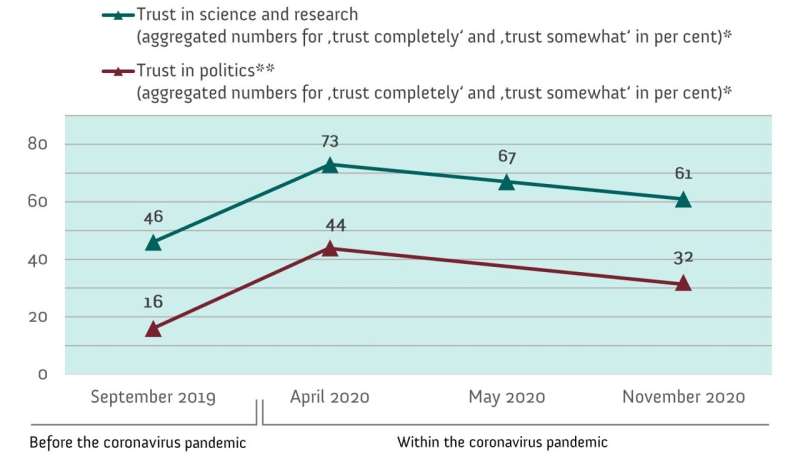Trust in science rose in Germany after onset of COVID-19 pandemic

Surveys conducted in Germany suggest that public trust in science rose after the start of the COVID-19 pandemic in 2020, while revealing different patterns of trust among different subpopulations. Rainer Bromme of the University of Münster, Germany, and colleagues present these findings in the open-access journal PLOS ONE on February 9, 2022.
Public trust in science is of great interest to many researchers, policy makers, and science communicators. The COVID-19 pandemic is a major factor that could influence trust in science. Germany presents an interesting setting for studying this influence, as it has less political polarization than other countries, and it experienced more successful containment in the early months of the pandemic.
For the new study, Bromme and colleagues analyzed data from several different rounds of Germany's Science Barometer survey, which is periodically conducted to capture public beliefs about science. The researchers compared results from September 2019, prior to the pandemic, with results from April, May, and November of 2020, after the pandemic began. The analysis included responses from a total of almost 4,000 respondents.
Statistical analysis of the survey responses suggests that overall public trust in science rose significantly in Germany after the pandemic began. This overall level of trust declined slightly by November 2020, but was still higher at that point than in September 2019.
The researchers also extensively explored relationships between trust in science and beliefs about politics, as well as other respondent characteristics. For instance, respondents who trust in science were more likely to believe that science should inform politics. In addition, increases in trust were strongest among people who had received higher levels of education. Meanwhile, supporters of the populist right-wing party AfD showed weaker increases in trust at the start of the pandemic and stronger decreases in trust as the pandemic progressed.
On the basis of their findings, the researchers propose strategies that science communicators may consider to maintain public trust in science while staving off false beliefs. Future research efforts could address some of the statistical limitations of this study and examine in greater detail the relationships between scientific and political beliefs.
The authors add: "We argue that for the general public in Germany, science is not a straw to grasp at in despair. Rather it is an anchor in troubled times, even when trust in the politics of coping with the pandemic is decreasing."
More information: Bromme R, Mede NG, Thomm E, Kremer B, Ziegler R (2022) An anchor in troubled times: Trust in science before and within the COVID-19 pandemic. PLoS ONE 17(2): e0262823. doi.org/10.1371/journal.pone.0262823
Journal information: PLoS ONE
Provided by Public Library of Science





















